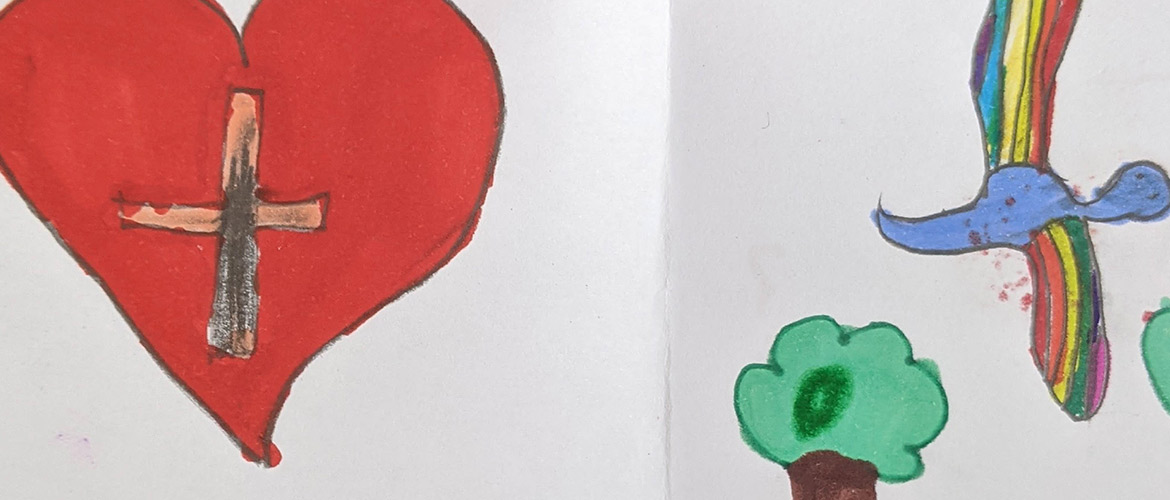Workshop Overview
The purpose of the activity was to use creative methods to reshape preconceived thought and dialogue patterns on the concept of migration. Referencing the PERCEPTIONS migrant interviews, the little books activity explored the project topics of faith, hope, loss, uncertainty, disorientation and invisibility through the visual arts.
Description of Activity
Using Sara’s own ‘little books’ format as inspiration, the activity creatively engaged participants (children) with migration themes by encouraging them to create visualisations of themes that appeared in the PERCEPTIONS migrant interviews. The themes for each page were as follows: Page 1, Faith, Hope and Love; Page 2, Disorientation; Page 3, Uncertainty; Page 4, Invisibility; and Page 5, Loss.
Outcomes
The workshop has been shared with the general public on the PERCEPTIONS social media channels (See Figure 5) and will also be situated on Swansea University’s PERCEPTIONS webpage. In doing this, others can imitate the workshop, including practitioners, to engage participants with migration themes.
Sara believes that children will “take [their booklets] home and tell the story of the migrants to their parents. Quite often parents will listen to their children, but they won’t listen to other people”. Therefore, it is likely that the children’s learning experience may translate into them teaching their parents about the migration themes they interacted with.
Through the PERCEPTIONS workshop feedback forms, the workshop contributed to 77% of participants believing their understanding of migrant experiences improved. One child wrote: “I enjoyed making the books and drawing the symbols, it was enjoyable and fun, but I would have liked extra time to finish.”
Impact
By enjoying relating their personal experiences with the PERCEPTIONS migrant interview themes of hope, loss, uncertainty, etc., the children understood points of view of people they may consider different to themselves, ensuring a positive and inclusive experience. Sara, the practitioner, had this to say about the children’s understanding: “I think most of them arrived not really understanding what a migrant was, or what migration is. I think, having explored all those key themes, they will have a better understanding of what people might experience when they come to another country, for whatever reason. They might have better empathy and connect better with them, and not discriminate against them.”
By enabling the children to try a new activity by creatively symbolising complex concepts, the workshop supported their personal progression by giving them the opportunity to artistically explore self-expression and self-discovery. Thus enabling the release of tensions and unresolved feelings related to themes experienced and shared by migrants, creating a synthesis of empathy between participants and migrants and the participants’ improved confidence in their artistic skills (Van Lith, Schofield, & Fenner, P., 2013).
Once they had been documented for the project, allowing the children to keep the physical creations they had made developed a sense of belonging and ownership in the children, where they are proud of the experience and output. The practitioner, Sara, further believes that by allowing them to take their creations home, the children would “tell the story of the migrants to their parents.” Thus, further spreading the knowledge gained by the children from the activity.
Children’s Feedback
“My favourite part was drawing the story with Sara.” (Hafod Primary Pupil)
“I enjoyed making the books and drawing the symbols.” (Hafod Primary Pupil)
“[My favourite part of the day was] making a book about migrants.” (Parkland Primary Pupil)
Team Involved
Swansea University: Sergei Shubin, Harrison Rees and Alan Bilton
Creative Practitioner: Sara Holden

